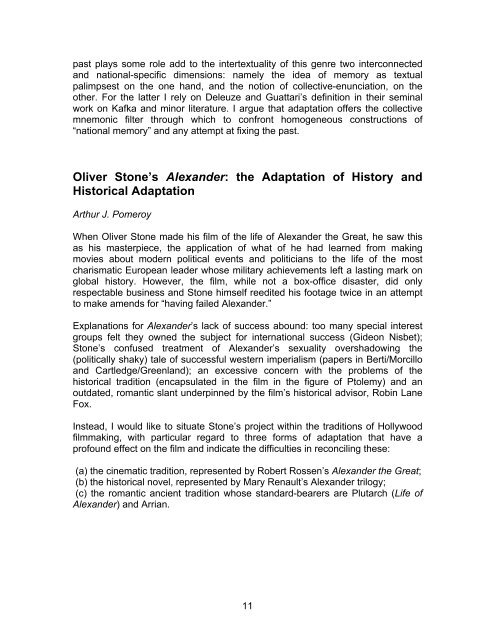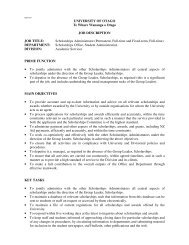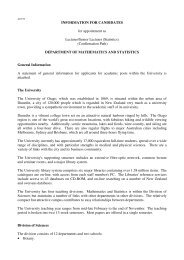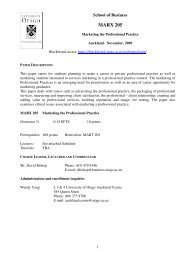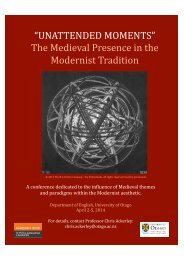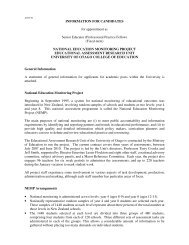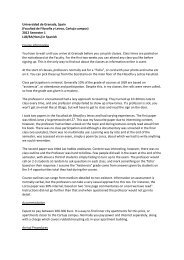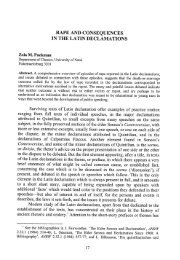CREATIVE IMITATIONS AND APPROPRIATIONS - University of Otago
CREATIVE IMITATIONS AND APPROPRIATIONS - University of Otago
CREATIVE IMITATIONS AND APPROPRIATIONS - University of Otago
You also want an ePaper? Increase the reach of your titles
YUMPU automatically turns print PDFs into web optimized ePapers that Google loves.
past plays some role add to the intertextuality <strong>of</strong> this genre two interconnected<br />
and national-specific dimensions: namely the idea <strong>of</strong> memory as textual<br />
palimpsest on the one hand, and the notion <strong>of</strong> collective-enunciation, on the<br />
other. For the latter I rely on Deleuze and Guattari’s definition in their seminal<br />
work on Kafka and minor literature. I argue that adaptation <strong>of</strong>fers the collective<br />
mnemonic filter through which to confront homogeneous constructions <strong>of</strong><br />
“national memory” and any attempt at fixing the past.<br />
Oliver Stone’s Alexander: the Adaptation <strong>of</strong> History and<br />
Historical Adaptation<br />
Arthur J. Pomeroy<br />
When Oliver Stone made his film <strong>of</strong> the life <strong>of</strong> Alexander the Great, he saw this<br />
as his masterpiece, the application <strong>of</strong> what <strong>of</strong> he had learned from making<br />
movies about modern political events and politicians to the life <strong>of</strong> the most<br />
charismatic European leader whose military achievements left a lasting mark on<br />
global history. However, the film, while not a box-<strong>of</strong>fice disaster, did only<br />
respectable business and Stone himself reedited his footage twice in an attempt<br />
to make amends for “having failed Alexander.”<br />
Explanations for Alexander’s lack <strong>of</strong> success abound: too many special interest<br />
groups felt they owned the subject for international success (Gideon Nisbet);<br />
Stone’s confused treatment <strong>of</strong> Alexander’s sexuality overshadowing the<br />
(politically shaky) tale <strong>of</strong> successful western imperialism (papers in Berti/Morcillo<br />
and Cartledge/Greenland); an excessive concern with the problems <strong>of</strong> the<br />
historical tradition (encapsulated in the film in the figure <strong>of</strong> Ptolemy) and an<br />
outdated, romantic slant underpinned by the film’s historical advisor, Robin Lane<br />
Fox.<br />
Instead, I would like to situate Stone’s project within the traditions <strong>of</strong> Hollywood<br />
filmmaking, with particular regard to three forms <strong>of</strong> adaptation that have a<br />
pr<strong>of</strong>ound effect on the film and indicate the difficulties in reconciling these:<br />
(a) the cinematic tradition, represented by Robert Rossen’s Alexander the Great;<br />
(b) the historical novel, represented by Mary Renault’s Alexander trilogy;<br />
(c) the romantic ancient tradition whose standard-bearers are Plutarch (Life <strong>of</strong><br />
Alexander) and Arrian.<br />
11


